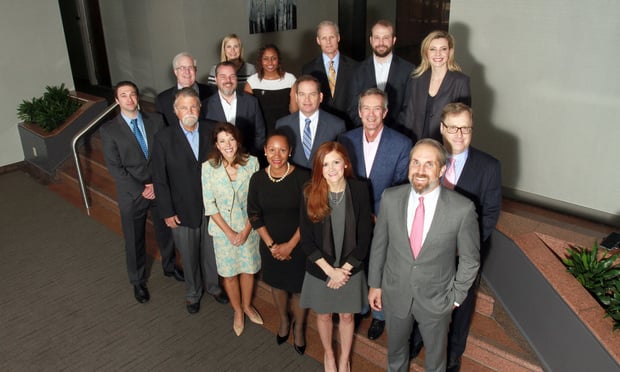Litigation Department of the Year, Midsize, General: Taylor English Duma
"Sometimes as trial lawyers you have to go with your instincts."
June 19, 2019 at 02:00 PM
6 minute read
 Taylor English Duma, Atlanta, general litigation (Photo: John Disney/ALM)
Taylor English Duma, Atlanta, general litigation (Photo: John Disney/ALM)
Taylor English Duma litigators scored some impressive victories in 2018.
One may have brought to an end a complex, decadelong dispute over ownership of Hampton Island, a 4,000-acre gated coastal community with lots sold at up to $4 million. It stemmed from the 2008 recession disrupting financing of island development and drew in a host of law firms and judges from different jurisdictions.
In Fulton County Superior Court, Taylor English won a motion to dismiss all claims against the firm's clients. The plaintiffs were investors who wanted the court to set aside previous rulings in other cases stemming from the recession's impacts.
In another case, the Georgia Court of Appeals issued a sweeping ruling that requires two insurance companies to fulfill their obligations to make available $117 million in primary and excess coverage to the firm's client—a dryer felt manufacturer defending ongoing litigation resulting from exposure to asbestos that its products contained years ago.
Taylor English also obtained summary judgment on virtually all claims, including all claims for damages, in a suit in the U.S. District Court for the Western District of Texas against client Bankrate for alleged trademark infringement involving Google search results.
The firm also achieved a major victory for client CNN. When a midlevel manager in CNN's marketing department sued for race discrimination and retaliation after he did not receive the promotions he felt he deserved over 13 years at the news network. The lawsuit created negative publicity for CNN, with the plaintiff discussing his claims to the press, including on a panel at the National Association of Black Journalists where he alleged CNN's top brass were racist.
A federal judge adopted a magistrate judge's report recommending a grant of summary judgment in favor of CNN. The ruling said that, of the nine positions the plaintiff claimed to have been passed over for as a result of race discrimination and retaliation, his qualifications and experience were severely lacking for seven, and he never even applied for one of the positions in question.
Taylor English attorneys also represented makers of grill replacement parts in a trademark and copyright case that tested how far online sellers can go in identifying parts that are similar to the parts sold by other companies. The clients included operators of online stores on Amazon and eBay that sell replacement parts for gas grills and HiPacking, a fulfillment center in Tucker, Georgia, for the products. A federal court in Nashville issued a modified temporary restraining order that allowed the Taylor English clients to stay in business and ordered Amazon to unfreeze their accounts.
Todd Jones, who co-chairs the firm's litigation practice, provided these answers.
One of your wins came in a case where the plaintiff's lawyer spoke freely about the claims in the news media. Although your job was to prevail in the litigation, how do your clients and you manage “the court of public opinion”?
When a litigation matter becomes public, it tends to be a strategy developed by opposing counsel to put pressure on our client. In these instances, we stay focused on the strategy and defense of the matter being litigated. Our best practice is to let the client's public relations firm take lead and manage the “court of public opinion,” as this team is the expert in media communications and understands the client's desired public persona.
What do you consider to be a crisis in litigation, and what is your advice to anyone who is going through such a crisis?
One “crisis” that most every litigation attorney has faced if he or she has been practicing long enough is the dreaded witness who “goes south” on you (i.e., witnesses who contradict what they previously represented would be their testimony); this often happens at a critical time, both while they are testifying in court and at depositions.
If this happens, somehow you have to remain stone-faced and pretend as if you expected the unanticipated testimony. If the opportunity presents itself on continued direct or redirect, do your best to minimize or correct the damaging testimony; otherwise, you may just need to cut your losses and move on.
Unfortunately, you can never take for granted that witnesses will testify exactly as they do in preparation. The main way to try to avoid this happening is to prepare, prepare, prepare, especially if your gut tells you that the witness may not be the strongest in sticking to his or her positions. Ask yourself: How fervent are they in general? Some witnesses naturally distrust their own memories in the face of a challenge. When preparing, try to identify the critical issues about which you need the witness to remain firm. If you suspect the witness is not being truthful with you in order to give you what he/she thinks you want to hear, that should be a red flag, as these types often are the ones who change their stories when the lights go on. It obviously helps if you have supporting testimony or documents that may buttress the witness.
Finally, sometimes as trial lawyers you have to go with your instincts: It may be too risky to put a weak witness on the stand, even if his/her hoped-for testimony would be very helpful to your case.
What time-saving tool helps your team the most?
There are all kinds of project management tools designed for litigation that can be helpful, but I'm going to go old school here and say the telephone. Picking up the phone and discussing the issue at hand with the client or opposing counsel allows for an issue to be resolved in 15 minutes versus an afternoon or longer of emailing back and forth. It also keeps you from having to take the time to remember where you are in the email conversation, since the telephone conversation happens real time.
This content has been archived. It is available through our partners, LexisNexis® and Bloomberg Law.
To view this content, please continue to their sites.
Not a Lexis Subscriber?
Subscribe Now
Not a Bloomberg Law Subscriber?
Subscribe Now
NOT FOR REPRINT
© 2025 ALM Global, LLC, All Rights Reserved. Request academic re-use from www.copyright.com. All other uses, submit a request to [email protected]. For more information visit Asset & Logo Licensing.
You Might Like
View All
Ex-Deputy AG Trusts U.S. Legal System To Pull Country Through Times of Duress
7 minute read
Q&A: UGA Law School Dean Peter 'Bo' Rutledge on His Transition Back to Private Practice
5 minute read
Morris Manning & Martin's First Chief Strategy Officer Eyes Marketing, Laterals for Growth
3 minute read
How I Made Partner: 'Begin to Build a Personal Brand,' Says Courtney Quiros of Alston & Bird
Trending Stories
- 1'It's Not Going to Be Pretty': PayPal, Capital One Face Novel Class Actions Over 'Poaching' Commissions Owed Influencers
- 211th Circuit Rejects Trump's Emergency Request as DOJ Prepares to Release Special Counsel's Final Report
- 3Supreme Court Takes Up Challenge to ACA Task Force
- 4'Tragedy of Unspeakable Proportions:' Could Edison, DWP, Face Lawsuits Over LA Wildfires?
- 5Meta Pulls Plug on DEI Programs
Who Got The Work
Michael G. Bongiorno, Andrew Scott Dulberg and Elizabeth E. Driscoll from Wilmer Cutler Pickering Hale and Dorr have stepped in to represent Symbotic Inc., an A.I.-enabled technology platform that focuses on increasing supply chain efficiency, and other defendants in a pending shareholder derivative lawsuit. The case, filed Oct. 2 in Massachusetts District Court by the Brown Law Firm on behalf of Stephen Austen, accuses certain officers and directors of misleading investors in regard to Symbotic's potential for margin growth by failing to disclose that the company was not equipped to timely deploy its systems or manage expenses through project delays. The case, assigned to U.S. District Judge Nathaniel M. Gorton, is 1:24-cv-12522, Austen v. Cohen et al.
Who Got The Work
Edmund Polubinski and Marie Killmond of Davis Polk & Wardwell have entered appearances for data platform software development company MongoDB and other defendants in a pending shareholder derivative lawsuit. The action, filed Oct. 7 in New York Southern District Court by the Brown Law Firm, accuses the company's directors and/or officers of falsely expressing confidence in the company’s restructuring of its sales incentive plan and downplaying the severity of decreases in its upfront commitments. The case is 1:24-cv-07594, Roy v. Ittycheria et al.
Who Got The Work
Amy O. Bruchs and Kurt F. Ellison of Michael Best & Friedrich have entered appearances for Epic Systems Corp. in a pending employment discrimination lawsuit. The suit was filed Sept. 7 in Wisconsin Western District Court by Levine Eisberner LLC and Siri & Glimstad on behalf of a project manager who claims that he was wrongfully terminated after applying for a religious exemption to the defendant's COVID-19 vaccine mandate. The case, assigned to U.S. Magistrate Judge Anita Marie Boor, is 3:24-cv-00630, Secker, Nathan v. Epic Systems Corporation.
Who Got The Work
David X. Sullivan, Thomas J. Finn and Gregory A. Hall from McCarter & English have entered appearances for Sunrun Installation Services in a pending civil rights lawsuit. The complaint was filed Sept. 4 in Connecticut District Court by attorney Robert M. Berke on behalf of former employee George Edward Steins, who was arrested and charged with employing an unregistered home improvement salesperson. The complaint alleges that had Sunrun informed the Connecticut Department of Consumer Protection that the plaintiff's employment had ended in 2017 and that he no longer held Sunrun's home improvement contractor license, he would not have been hit with charges, which were dismissed in May 2024. The case, assigned to U.S. District Judge Jeffrey A. Meyer, is 3:24-cv-01423, Steins v. Sunrun, Inc. et al.
Who Got The Work
Greenberg Traurig shareholder Joshua L. Raskin has entered an appearance for boohoo.com UK Ltd. in a pending patent infringement lawsuit. The suit, filed Sept. 3 in Texas Eastern District Court by Rozier Hardt McDonough on behalf of Alto Dynamics, asserts five patents related to an online shopping platform. The case, assigned to U.S. District Judge Rodney Gilstrap, is 2:24-cv-00719, Alto Dynamics, LLC v. boohoo.com UK Limited.
Featured Firms
Law Offices of Gary Martin Hays & Associates, P.C.
(470) 294-1674
Law Offices of Mark E. Salomone
(857) 444-6468
Smith & Hassler
(713) 739-1250






